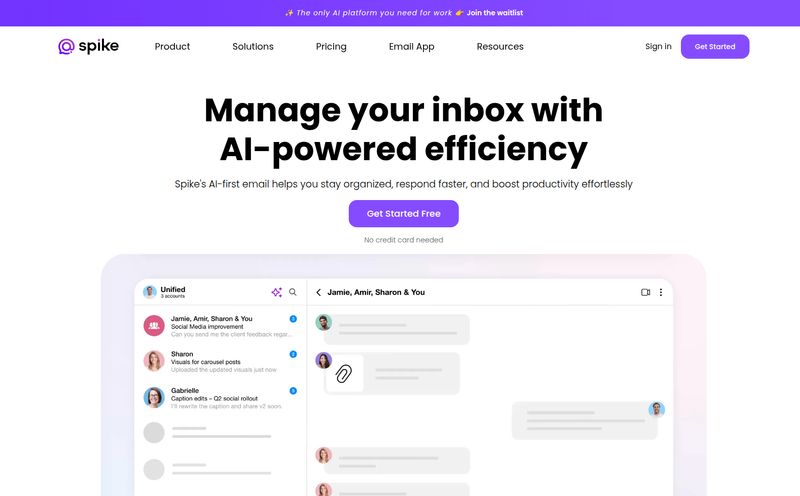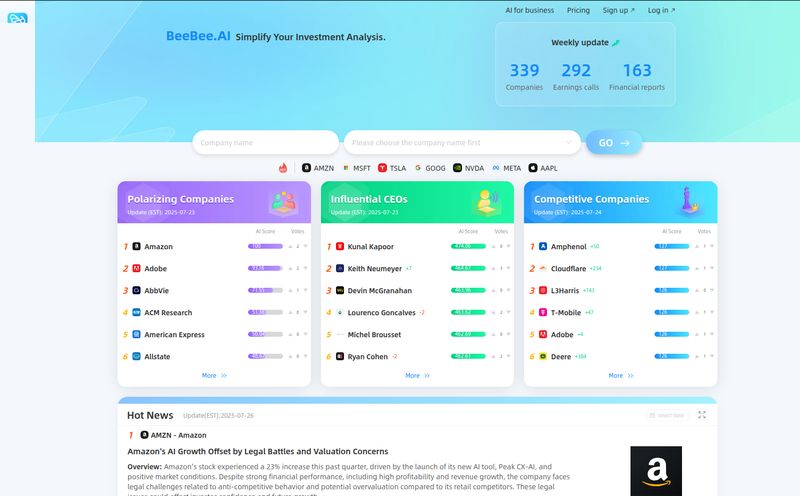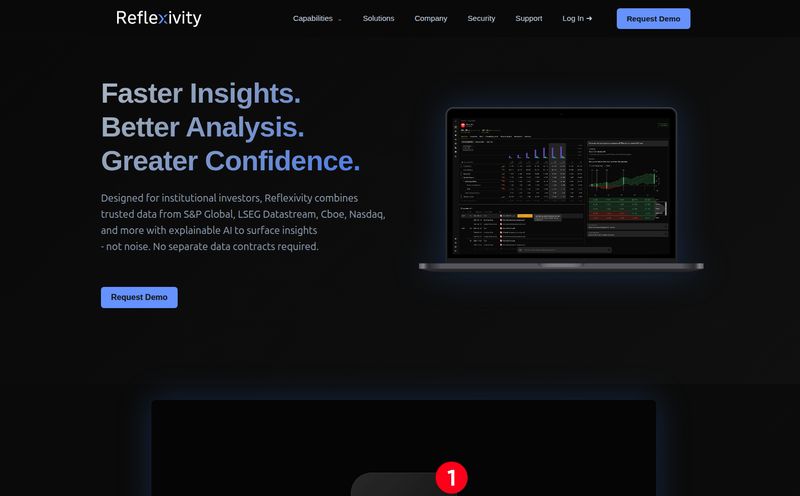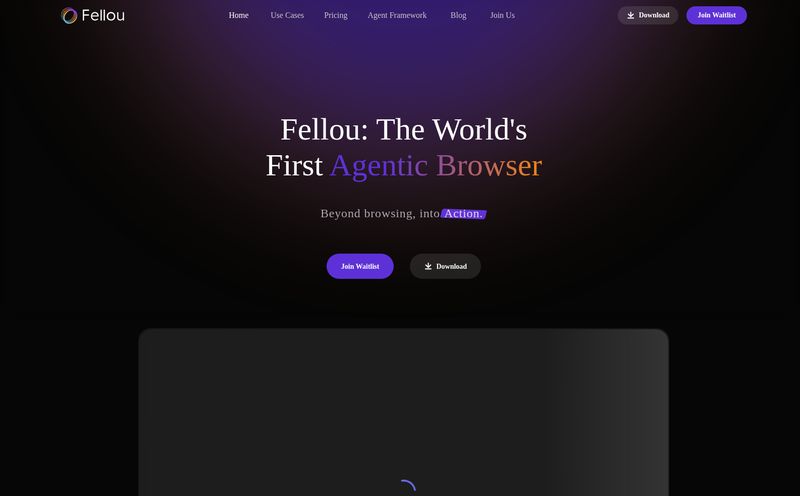We all know we should be doing more user research. It's hammered into us from every product management book and UX design conference. “Talk to your users!” they scream. But who has the time? Between the endless back-and-forth emails trying to find a slot, the time zone gymnastics, and the inevitable no-shows, just scheduling five interviews can feel like a full-time job.
It’s the dirty little secret of product development. We often cut corners on research because it’s just… a logistical nightmare. So when I stumbled upon a tool called AskMore, which claims to use AI to run the whole show for you, my ears perked up. My inner skeptic, honed by years of seeing overhyped MarTech tools, immediately raised an eyebrow. But my inner, overworked product guy was leaning in close, whispering, “please be good, please be good.”
So, I decided to take a proper look. Is this another AI gimmick, or is it the research assistant we’ve all been dreaming of?
So What is AskMore Anyway?
At its core, AskMore is an AI-powered platform that conducts user interviews on your behalf. You don't schedule a Zoom call. You don't send a calendar invite. You just tell the AI what you want to learn, and it generates a special interview link. You then share this link with your users, leads, or anyone on your email list, and they can complete the interview whenever they want. On their lunch break, at 2 AM, whenever. It’s completely asynchronous.
Think of it like having a team of tireless, multilingual research assistants who work 24/7. They don’t need coffee, they never get tired, and they can chat with someone in Tokyo one minute and someone in Berlin the next. The AI asks research-backed questions, probes for deeper insights, and then—and this is the magic part—it automatically analyzes everything and hands you a neat report. It's a pretty bold promise.

Visit AskMore
The Good Stuff That Genuinely Impressed Me
I'm naturally wary of anything that promises to automate a human-centric process. But after digging in, a few things about AskMore stand out as legitimately solving some of the most tedious problems in our industry.
Finally, An End to Scheduling Hell
I can’t overstate how much I loathe coordinating schedules. It’s a special kind of purgatory. Trying to find a 30-minute slot that works for a busy professional in another country is an exercise in frustration. AskMore just... sidesteps that entire dance. By making the interviews asynchronous, it removes the single biggest bottleneck to getting feedback. This isn't just a small convenience; it fundamentally changes the speed at which you can operate. You could theoretically get feedback from 100 users in the time it would take you to schedule ten live interviews. That’s a game-changer.
Breaking the Language Barrier with a Click
Ever wanted to get feedback from your growing user base in Brazil or Japan but don't have a Portuguese or Japanese-speaking researcher on staff? This is where AskMore gets really interesting. It can conduct interviews in pretty much any language. This opens up a whole new world of customer discovery. You’re no longer limited to the English-speaking bubble, which can be a huge source of bias for globally-minded products. You get to hear from a much more representative slice of your actual user base.
The Automated Report Genie
Okay, so let’s say you do manage to complete a bunch of live interviews. What happens next? Hours of transcribing, highlighting, and trying to synthesize pages of notes into actionable insights. It’s tedious work. AskMore’s promise of automated report generation is a massive carrot. If the AI can successfully pull out key themes, pain points, and direct quotes, it could save a team dozens of hours per research cycle. That’s more time spent building and less time doing admin. I’ll take that deal any day of the week.
Let's Be Realistic Here, The Obvious Caveats
Of course, it’s not all sunshine and automated reports. No tool is perfect, and we have to talk about the potential downsides. This is where the old-school researcher in me puts his foot down.
The Nuance of Human Connection
The big, glowing question mark is this: Can an AI truly replicate the empathy and intuition of a human interviewer? I've always felt that the best insights from an interview come from the unsaid. The hesitation in someone's voice, the way their eyes light up when they talk about a specific feature, the sarcastic laugh when they describe a frustrating workflow. These are the golden nuggets. An AI, no matter how advanced, is working with text. It might miss the subtext, the emotion, the humanity of it all. For deep, exploratory research where you're trying to uncover unknown unknowns, I’m not yet convinced AI can go teh distance alone.
The Pay-to-Play Model
AskMore operates on a credit system. One credit per participant. This is fair, but it's something to be aware of. After the free trial, you're paying for access. This isn’t a knock on them—they’re a business, and they should get paid for the value they provide. It just means you need to be strategic about who you send that interview link to. You can’t just spray and pray. You need a targeted list to make sure your credits are well-spent.
Is It Right for Every Research Question?
I see AskMore as an incredible tool for certain jobs. Validating a new feature idea? Perfect. Getting quick feedback on a prototype? Absolutely. Gauging interest in a new product direction? Yep. But if you’re trying to do foundational, ethnographic research to understand a person's entire world, this probably isn't the right hammer for that nail. You'll still need to get on a plane or, at the very least, a long, in-depth video call.
A Look at the AskMore Pricing Structure
The pricing is pretty straightforward and based on credits. They offer a few tiers, which I've broken down here. It seems designed to scale with your research needs, from a quick pulse-check to a larger study.
| Plan | Credits | Price | Best For |
|---|---|---|---|
| Starter | 10 Credits (10 Participants) | $9 | Solo founders or a quick test. |
| Growth | 45 Credits (45 Participants) | $39 | Startups doing regular feedback rounds. |
| Scale | 125 Credits (125 Participants) | $99 | Larger teams or big research projects. |
| Enterprise | Custom Credits | Contact Us | Unlimited usage for large organizations. |
In my opinion, the value is pretty clear, especially when you compare the cost to the man-hours saved. The $99 plan for 125 interviews is particularly compelling. The cost of acquiring, scheduling, and interviewing 125 people manually would be astronomically higher. For more details, you can always check out their official pricing page.
So, Who Is This For? My Final Take
After looking at it from all angles, I don't see AskMore as a replacement for human UX researchers. I see it as a force multiplier. It's a tool that empowers them to do more, faster.
This is perfect for:
- The Indie Hacker or Solo Founder: Who has to do everything and needs user feedback without spending a week on logistics.
- The Agile Product Team: That wants to run quick, weekly feedback cycles on new builds and ideas.
- The UX Researcher on a Small Team: Who needs to scale their efforts and get more voices into the product development process.
It's probably not for the team that's doing a six-month-long deep dive into cultural habits for a brand new market entry. But for the 90% of day-to-day product research? This feels like a powerful new weapon in the arsenal.
It’s not the self-driving car of user research just yet, but it’s a damn good cruise control system that lets you focus on the important parts of the road ahead.
Frequently Asked Questions About AskMore
- 1. Can AskMore completely replace my UX research team?
- No, and it shouldn't. Think of it as a tool that handles the repetitive, time-consuming parts of research (scheduling, outreach, basic questioning, transcription). This frees up your human researchers to focus on deeper strategic analysis, follow-up interviews, and complex problem-solving.
- 2. How does the multi-language feature actually work?
- The platform uses sophisticated AI models that are trained in multiple languages. When you set up your interview, you can specify the target language. The AI will then conduct the entire conversation in that language and provide the final report back to you in English, saving you the hassle of translation.
- 3. Is user data kept private and secure?
- While you should always check the latest privacy policy on their site, platforms like this are built with data security in mind. They typically handle user responses with strict confidentiality, ensuring participant anonymity and data protection, as their business model depends on trust.
- 4. What does the final automated report look like?
- The report is designed to be easily digestible. It synthesizes the findings from all the interviews, pulling out key themes, user pain points, positive feedback, and direct, impactful quotes. The goal is to give you actionable insights without you having to read through hours of raw transcripts.
- 5. Are the interview questions any good?
- AskMore states they use “research-backed questions.” This generally means the AI is programmed to ask open-ended, non-leading questions based on established UX research methodologies, like the Jobs-to-be-Done framework or problem discovery techniques, to elicit honest and useful feedback.
- 6. Is there a free trial to test it out?
- Yes, the platform is built around the idea of letting you see the value first. You can typically sign up and get a number of free credits to run your first few interviews and see if the workflow and the quality of insights work for your team.
Wrapping It All Up
In a world overflowing with AI solutions looking for a problem, AskMore feels different. It targets a real, persistent, and deeply annoying problem for anyone trying to build a better product. It makes user feedback faster, more accessible, and more scalable. While it won't replace the deep, empathetic connection of a face-to-face conversation, it absolutely crushes the logistical grunt work, and for many of us, that's more than half the battle.
Reference and Sources
- AskMore Official Website
- AskMore Pricing Page
- User Interviews: The Beginner's Guide by Nielsen Norman Group



